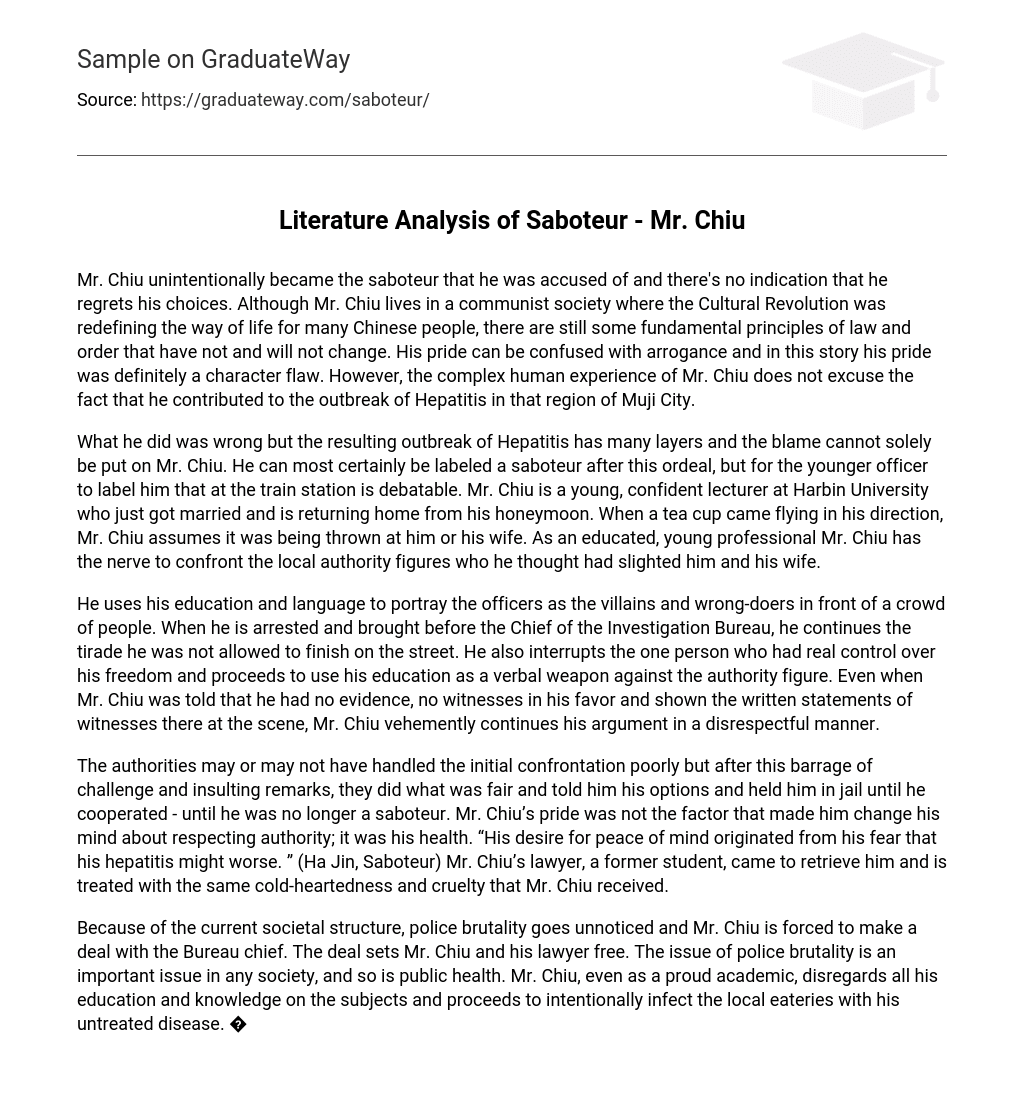Mr. Chiu unintentionally became the saboteur that he was accused of and there’s no indication that he regrets his choices. Although Mr. Chiu lives in a communist society where the Cultural Revolution was redefining the way of life for many Chinese people, there are still some fundamental principles of law and order that have not and will not change. His pride can be confused with arrogance and in this story his pride was definitely a character flaw. However, the complex human experience of Mr. Chiu does not excuse the fact that he contributed to the outbreak of Hepatitis in that region of Muji City.
The action taken by Mr. Chiu was incorrect, but the ensuing Hepatitis outbreak has multiple aspects and it would not be entirely fair to solely blame him for it. It is reasonable to consider him a saboteur after this incident, although whether the younger police officer should have labeled him as such at the train station can be debated. Mr. Chiu is a lecturer at Harbin University, a young and confident individual who recently got married and is now returning from his honeymoon. When a tea cup was thrown in his direction, Mr. Chiu assumed it was aimed at him or his wife. Being an educated and professional person, Mr. Chiu had the audacity to confront the local authorities whom he believed had offended him and his wife.
Using his education and language, he depicts the officers as the antagonists and wrongdoers in front of a crowd. Upon being arrested and presented before the Chief of the Investigation Bureau, he persists with the diatribe he was prevented from completing on the street. Moreover, he disrupts the sole individual with genuine power over his freedom and employs his education as a verbal weapon against this authoritative figure. Even when informed that he lacks evidence and witnesses in his favor, and confronted with written statements from witnesses present at the scene, Mr. Chiu vehemently persists in his disrespectful argument.
Despite potential mishandling of the initial confrontation, the authorities eventually acted fairly by informing Mr. Chiu of his options and detaining him until he cooperated, thereby ceasing his sabotage efforts. It was not pride but concern for his health that prompted Mr. Chiu to reconsider his attitude towards authority. In fact, his fear of worsening hepatitis fueled his desire for peace of mind. When his lawyer, also a former student, arrived to free him, they were met with the same heartlessness and cruelty that Mr. Chiu had experienced.
Police brutality often goes unnoticed due to the current societal structure, which forces Mr. Chiu to strike a deal with the Bureau chief in order to secure his and his lawyer’s freedom. Both police brutality and public health are significant issues in every society. Despite being a proud academic, Mr. Chiu disregards his education and knowledge on these matters and deliberately infects local eateries with his untreated disease. It is as if Mr. Chiu, driven by hunger, drags his lawyer from one restaurant to another near the police station, but he only orders a maximum of two bowls of food at each place.
Fenjin was curious about why his teacher wouldn’t stay in one place and eat a satisfying meal. Mr. Chiu visited four different restaurants and ordered noodles, wonton, eight-grain porridge, and chicken soup. While eating, he muttered under his breath, “If only I could eliminate all these people!” (Ha Jin, Saboteur). Even his lawyer was perplexed and taken aback by Mr. Chiu’s discolored and jaundiced face, as well as his peculiar behavior. Though Mr. Chiu may have seemed innocent initially, his actions in the end prove his involvement in the spreading of Hepatitis, without confirming that he is the source of the disease.





